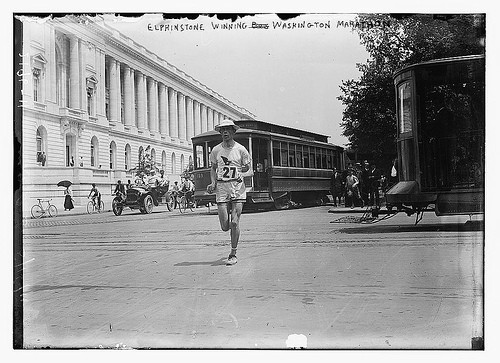As I mentioned recently, I have just signed up for the Leavenworth Marathon in October 2012. Now as I get more serious about developing a running strategy, I am thinking about what my goal marathon pace should be. What follows here is some of the best advice that I could gather from experts along with my own 2 cents.
Like most first time marathoners, I probably started my first marathon a couple of years ago a bit faster than I should have. Not because I ran faster than my goal pace, but because I probably set my goal pace to ambitious. As a result, I didn’t finish the race strong. I’m hoping this marathon will turn out a bit differently, so setting the correct goal pace is very important in my opinion.
1. Run a Race
The best way to predict what your body might be able to do during a marathon is to have run one before. An interesting article by Matt Fitzgerald has this to say,
New research shows that pacing in running races is controlled primarily by the subconscious brain. Throughout each race, your brain calculates the fastest pace you can sustain without endangering your life and uses feelings of fatigue and reduced electrical output to your muscles to ensure that you run no faster. The more experience you have as a runner, the more reliable these calculations become.
Everyone agrees that nothing can prepare you for the fatigue you experience in the final miles of your first marathon. But after you have had this experience, you are better able to pace yourself effectively in future marathons. Most of this learning happens on a subconscious level. Your brain-body makes its way through your second marathon with a better sense of how you should feel at any given point in the race.
So treat your first marathon as a sort of experiment. Pace yourself cautiously but not fearfully and see what happens, knowing that, no matter what happens, you will pace yourself better in the next marathon for having done the first.
2. Use Online Calculators
Another way to try and predict what sort of marathon goal pace you should set is to extrapolate based on shorter distances that you have run (preferably races). One popular race time calculator is the McMillan calculator. Using this or other calculators will allow you to input what your race time was and will then “predict” what your marathon pace might be.
The calculations are based on the race distance you ran and what its trying to predict, mile trained, and more. Obviously if you are able to run a half-marathon, that calculation will be much more accurate than if you just ran a 5k.
Of course, these calculators can only be accurate to a certain degree; alot can happen between mile 13 and mile 26. So, while its a good guideline to follow, no online calculator is going to be 100% accurate.
3. Wait to set your Goal Pace
One important thing to consider is to NOT set your goal pace in stone to early in your training schedule. Sure, you should have a good idea of what your goal pace should be so that you can train, but you should wait until perhaps only a few weeks before you set your official goal pace.
By waiting, you will have a much better idea what type of shape you are really in, and perhaps will even give you time to run a shorter distance race that you can use to extrapolate your marathon goal.
Or even better yet, you can run multiple races (5k, 10k, half-marathon, etc) throughout your training program. With each subsequent race, you can adjust your marathon goal pace based on the your performance results.
In conclusion, its important to determine what your marathon goal pace should be and to stick with that plan. Don’t make the common rookie mistake (that I made) and start out too fast in your first marathon. I’m hoping that now with my 3rd marathon in October, that I will be able to set a more realistic goal and be able to finish stronger. Be sure to stick around and follow my progress!


